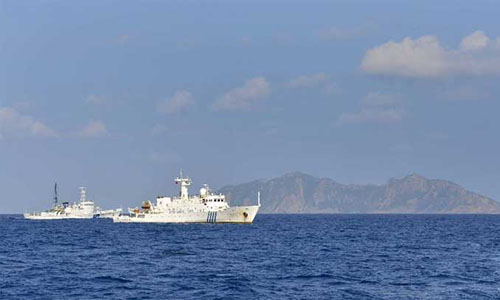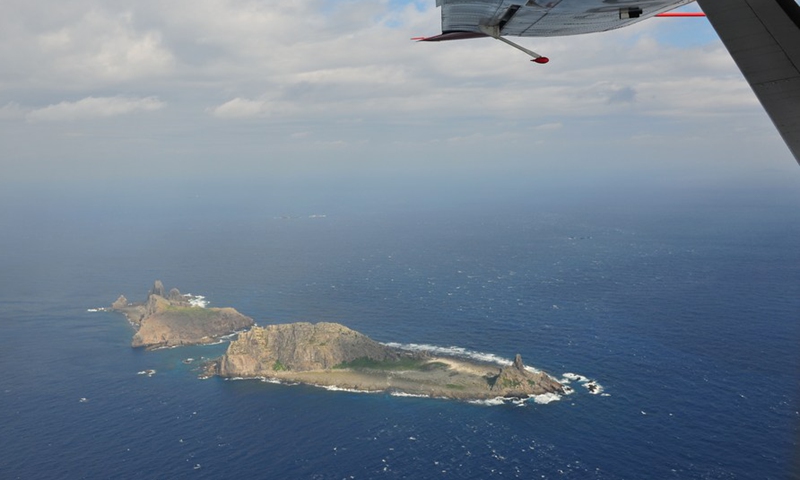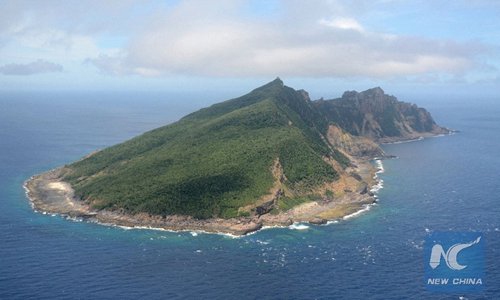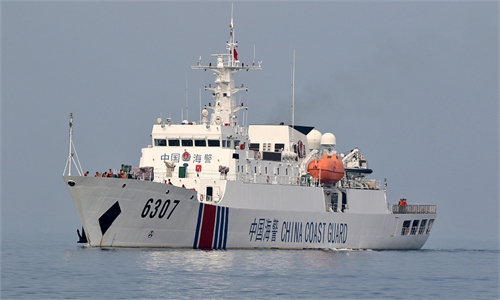China issues report on Diaoyu Islands to 'reaffirm sovereign rights, warn Japan and US collusion'

The China Marine Surveillance ships patrol around the Diaoyu Islands, October 25, 2012. Photo: Xinhua
China released a report on the topography and geography of the Diaoyu Islands on Monday amid Japan's growing desire to make the US back it up on the topic.
Chinese experts saw the latest report as a strong message that reaffirmed China's sovereignty over the islands to the world with facts, openness and transparency, and warned Japan and the US that their collusion will face consequences if they fail to respect China's stance on the issue.
On the special website of the Diaoyu Islands created by the Ministry of Natural Resources in eight languages, the ministry published a topography and geography survey report of the Diaoyu Islands and their affiliated islands, detailing the terrain of the islands along with remote sensing image maps.
The purpose of the survey was to obtain geographic data for the latest topographic maps, and the survey has further improved the basic data system of the islands and plays an important role in the resource management and ecological protection of the islands, the ministry said.
China issued the report at a time when Japan intensified its alliance with US on a tough stance against China over the Diaoyu Islands since Joe Biden took office in January, thus prompting the Biden administration to commit to the defense of Japan under their security treaty that covers the Diaoyu Islands.
Geography is closely connected with territory and sovereignty, and China's latest move is not just a scientific survey but a strong diplomatic and political signal to the world, including the US and Japan, that the Diaoyu Islands are an inalienable part of the Chinese territory, Li Haidong, a professor at the Institute of International Relations of the China Foreign Affairs University, told the Global Times on Monday.
"Japan and the US have tried to create chaos in the international community and to confuse the fact that China has indisputable sovereign rights over the territory [of the Diaoyu Islands]. We issued the survey report to reiterate the international consensus on the issue," Li said, noting that the topographic maps of Diaoyu Islands are likely to be printed in multiple languages for the world to learn the facts.
"No matter how Japan colludes with the US on the topic in an attempt to distort international consensus, it will not change China's position and actions, including regular patrols around the islands and fishing activities," Li said.
He said China's report also serves as a warning to Japan and the US that if they fail to respect China's sovereignty, they would have to face consequences.

File photo taken on a marine surveillance plane B-3837 shows the Diaoyu Islands and nearby islands.Photo:Xinhua
Japan's recent moves have seriously damaged China-Japan relations, making Japanese people who do not know the truth about the issue show unfavorable views of China, and it's necessary for China to further explain the situation on the Diaoyu Islands to the public based on facts, Liu Jiangyong, vice dean of the Institute of Modern International Relations at Tsinghua University, told the Global Times on Monday.
Japan's practice of "refusing to set aside the dispute" with China has made the Diaoyu Islands issue a bottleneck in China-Japan relations and something most likely to provoke antagonism and lead to tensions between the two countries, Liu said, noting that enhancing information on the legal and natural conditions of the Diaoyu Islands will help Japanese people and the international community get to know more about the relevant situation.
In recent years, Japan attempted to fabricate stories to form a simple "diplomatic statement," launch "brainwashing education" among its citizens, and dodge discussions on the Diaoyu Islands issue, Liu said.
Liu recalled a previous seminar on the islands, during which Liu used historic data and evidence to make Japanese experts speechless in a face-to-face confrontation, and the Japanese side then approached the seminar organizer demanding that Liu not be allowed to attend such seminars in the future.
Japan's actions reflect its guilt, and Japan cannot unilaterally deprive the public of its right to know the truth, which is very dangerous, Liu said.
On Japan-US collusion, Li said it's unlikely for the US to help Japan in case of military conflicts between China and Japan, as the American way of doing things is to "satisfy itself at the expense of others," Li said, adding that the US would only fan the flames in case of a conflict between Japan and China.
Chinese analysts said that it's unwise for Japan to take the US' commitment as an infallible guarantee and Japan should avoid miscalculating the US' intentions of using every possible ally to contain China.
But if Japan and US escalate their provocations in waters surrounding the islands, such as sending troops, China's People's Liberation Army Navy and Air Force would take action, like patrol the area, to show China's determination to safeguard its territory, experts said.




